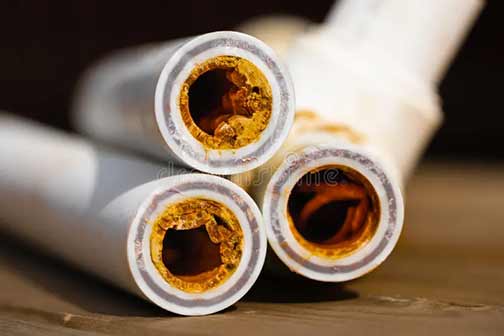
If you live in Chicago, the water entering your home is likely hard, and your plumbing may be experiencing various issues as a result. The minerals in hard water are slowly harming the water-using appliances in your house and your plumbing, even if you don’t realize it, notes Rentifi Property Management.
What is hard water? How does it affect your health, plumbing, and home maintenance costs?
What is hard water?
Water hardness is a measure of the amount of dissolved minerals (calcium and magnesium) in a home or region’s water supply, expressed in grains per gallon (GPG) or parts per million (PPM). Hard water has higher amounts of dissolved minerals than soft water.
Water typically becomes hard when it passes through rock layers that are rich in calcium and magnesium before reaching the surface. Chicago has hard water because its water primarily comes from Lake Michigan and underground sources rich in calcium and magnesium.
Impact of hard water
What are the signs and impact of hard water on your home and health?
Scale buildup
Mineral deposits build up within pipes, faucets, and fixtures, restricting water flow and causing blockages. Limescale deposits create performance issues in your home when they restrict the flow rate of water in your fixtures and appliances. These efficiency issues diminish your enjoyment of the plumbing fixtures and appliances in your home.
Corrosion in your plumbing
Hard water minerals weaken the integrity of pipes, valves, seals, gaskets, joints, and other fittings, accelerating the rate of wear and tear in these critical components. This happens because of the chemical reactions between the minerals in hard water and the protective coating of pipes and other features. Corrosion makes your plumbing more prone to leaks and structural failures.
Effect on home appliances
Scale deposits in the water-utilizing appliances impact their performance by limiting water flow and impairing heating efficiency. By forcing these appliances to work longer, hard water inflates your energy bills and increases the rate of degradation in appliances. This shortens the lifespan of washing machines, dishwashers, coffeemakers, water heaters, etc.
Stains on glassware and surfaces
Hard water leaves ugly water stains and spots on dishes, drinking glasses, silverware, glass shower doors, sinks, shower walls/curtains, showerheads, bathtubs, faucets, and other surfaces. Items in the home that are washed and rinsed in water will have blotches after they dry. This impacts the overall cleanliness of your home and forces you to do extra work, wiping away stains.
Skin and hair irritation or damage
Hard water irritates the skin by stripping it of oil, leaving it dry, itchy, dull, and prone to suffer from breakouts due to clogged pores. The minerals in hard water can also worsen existing conditions like eczema, psoriasis, and dandruff. Hard water will coat the hair with scale and soap scum, making it dull, dry, tangled, very hard to wash, and prone to breakage.
Soap scum and clogged drains
Hard water interacts badly with soap. Instead of foaming as it should, soap forms a white/grey chalky residue that does not dissolve in water. This forces you to use more soap and detergent when taking showers, washing, or doing laundry. Soap scum also combines with hair and other debris to cause problems – clogs and blockages – inside your drainage pipes.
The ultimate consequences of hard water are overall higher home maintenance costs and a significantly lower quality of life. How can you solve this problem?

Water softener: the way to fix hard water
A water softener continuously removes the hard minerals in hard water as water flows through it. It does this through a process known as “Ion Exchange,” wherein hard water minerals (calcium and magnesium) are swapped out for sodium ions or potassium ions, thus softening the water.
One of the great things about installing a water softener in your home is that, with time, the scale deposits that have built up inside your home gradually start to dissolve and disappear. Effectively, a water softener actually reverses the impact of hard water on your plumbing and appliances.
This means you can solve the problem of scale buildup in your pipes and appliances, enhance the performance of your home’s critical systems, while also prolong their service life. Water softeners allow you to save more money with minimal effort because they are completely automated.
What are the things to think about before installing a water softener in your Chicago home? You must know the water hardness level in your home to select the right water softener system. Your home must also have sufficient drainage and water pressure for the system.
To help you resolve the different pieces of the equation when installing a water softener, you need an experienced plumber. A competent plumber will consider the different dimensions of the water hardness issue in your home to recommend a water softener that suits your needs.

